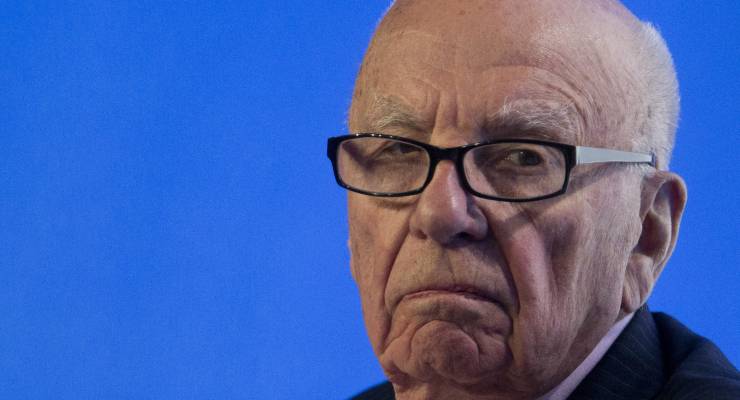
The continually accumulating cost to News Corp of its UK phone hacking scandal has now broken through to more than £800 million or about A$1.6 billion at today’s exchange rate.
The scandal marks the end of the once relentless rise of News Corp. A decade on from the first revelations, News of the World (the paper that first brought the Murdochs to London) is long closed and The Sun has joined that gaggle of News Corp assets that it can’t sell and won’t close.
About one-eighth of these billions were paid to the victims of the hacking. That’s according to Crikey‘s review of the past decade of company reports from News Group Newspapers Ltd (the News Corp subsidiary which operates The Sun).
These victims were the celebrities (and often non-celebrities) caught up in the company’s phone hacking, police bribes and improper influence to get stories mainly for News of the World. It seems to go as far back as the 1990s, accelerating from 2005. The Guardian broke the story in 2009 and its steady reporting saw the scandal explode out of control. Two years later it was revealed News of the World had hacked the phone of missing teenager Milly Dowler.
The names paid out are a who’s who of the UK, from the royal family down. There’s more to come too. News Corp’s end-of-year US filings indicate that it has a continuing provision of about A$70 million for unresolved claims.
The big winners? The lawyers, of course. According to the UK reports, News Corp has paid more than £292 million (A$575 million) in legal fees to manage the scandal since 2011.
Other than lawyers, the largest single cost is the closure of the News of the World following the Dowler exposé. This cost News Corp £60.6 million (A$119 million) in redundancies and restructuring costs. The company had to write off the masthead’s value at £160 million (A$315 million) and was shamed into donating the revenues of the paper’s final edition (about £3 million or A$5.9 million) to charity.
The remaining costs (about £129 million or A$254 million) went to the inquiries and costs of the so-called Management and Standards Committee, set up as an independent entity within News Corp to oversee the masthead’s ethical behaviour.
The figures throw into relief the impact on the company, particularly on its once powerful UK journalism, which started with buying the News of the World in 1969. In 1982, The Sun journalistically patented “GOTCHA” in celebration of the sinking of the Argentine warship General Belgrano (killing 323). In 1992, it could brag that it changed elections (“It’s The Sun Wot Won It”).
When the scandal broke open in 2011, The Sun was selling more than 3 million copies a day. Now, it’s latest figures show sluggish annual revenues of about £400 million off a declared circulation of 1.38 million.
As a mass market tabloid, it’s been unable to follow other mastheads in building digital reader revenues behind a paywall.
Under the terms of the 2013 corporate split, many of these costs have been passed on to its corporate cousin Fox which has indemnified News Corp for “civil claims and investigations … as well as legal and professional fees”. Some will also be covered by insurance for the company directors.
The big cost is the opportunity cost: the scandal cost the Murdochs’ ownership of British satellite broadcaster, Sky Limited, and its related European pay television subsidiaries. That ownership — and the healthy cashflows it delivers — was set to be the centre of the global empire.
A decade ago, the scandal forced the Murdochs (who owned a controlling 39.1%) to abandon their bid for full control of the company. After the news broke, it was forced to abandon the bid. By the time it was able to revisit the offer in late 2016, it found itself out-bid by US competitor Comcast.
By then, the Murdochs had sold their Sky holding to Disney as part of the merger with 20th Century Fox. Disney, in turn, sold out to Comcast, leaving News Corp as a far more marginal player in the UK media market — the place where it began its global growth.








And long may it run.
Bad luck about all the redundancies at NoTW but the good news is that Rebekkah Brookes still has a job with the Murdochs.
She’ll always have a place under Rupert.
That hacking sound you hear is News Corp coughing up $1.6 billion. Wonderful news!!!
Newscorpse is the biggest bunch of lying racist homophobic misogynist Christian-fascist wing nuts outside of the Australian government. I have zero sympathy. If anyone starts a crowdfunding campaign for a hacker to bring the whole stinking edifice down, I’ll donate.
Worst abuse of journalism and media company power.
Since Watergate, the Washington Post, and Katherine Graham:
Best example of investigative journalism – Nick Davies.
Best example of a media company withstanding enormous pressure to back their (contracted) journalist and keep the story going – Editor Alan Rusbridger and The Guardian UK.
Money and power are the only things Murdoch values. In the UK, after losing the cash cow Sky Satellite, and lost credibility, he’s gone backwards. Niiiiiiice.